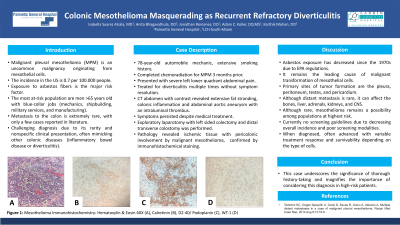Monday Poster Session
Category: Colon
P1696 - Colonic Mesothelioma Masquerading as Recurrent Refractory Diverticulitis
Monday, October 23, 2023
10:30 AM - 4:15 PM PT
Location: Exhibit Hall

Has Audio

Jonathan Romanes, DO
Palmetto General Hospital
Pembroke Pines, FL
Presenting Author(s)
Isabella Suarez Alcala, MD1, Anita Bhagavathula, DO2, Jonathan Romanes, DO3, Adam Z. Koller, DO, MS4
1Palmetto General Hospital, Hialeah, FL; 2LCH South Miami, Doral, FL; 3Palmetto General Hospital, Pembroke Pines, FL; 4Palmetto General Hospital, Coral Gables, FL
Introduction: Diagnosing colon metastasis in malignant mesothelioma is challenging due to its rarity and nonspecific clinical presentation, often mimicking inflammatory bowel disease or diverticulitis. We present a case of refractory diverticulitis secondary to metastatic mesothelioma to the colon.
Case Description/Methods: A 78-year-old automobile mechanic with an extensive smoking history presented 3 months after completing chemoradiation for malignant pleural mesothelioma (MPM) with severe left lower quadrant abdominal pain. The patient had been treated for diverticulitis multiple times in the preceding months without symptom resolution. On admission, the patient had abdominal tenderness without guarding. CT abdomen and pelvis with contrast revealed extensive fat stranding and inflammation of the descending and proximal sigmoid colon and an infrarenal abdominal aortic aneurysm with an intraluminal thrombus. The patient was subsequently started on fluids and antibiotics. However, his symptoms persisted. Due to failure of conservative management, he underwent exploratory laparotomy with lysis of adhesions and was noted to have a contained sigmoid perforation. A left sided colectomy with distal transverse colostomy was performed. The surgical specimen from the sigmoid colon revealed ischemic tissue with pericolonic involvement by malignant neoplasm, compatible with mesothelioma, which was confirmed by immunohistochemical staining.
Discussion: While asbestos exposure has decreased since the 1970s due to EPA mandated regulations regarding the handling and disposal of asbestos waste, it remains the leading cause of malignant transformation of mesothelial cells. Primary sites of tumor formation include the pleural lining, peritoneum, testes, and pericardium. Although distant metastasis is rare, it can affect the bones, liver, adrenals, kidneys, and CNS. Mesothelioma rarely presents within the colon but remains a possibility among populations at highest risk (men with age greater than 65 working in industries with asbestos exposure, specifically manufacturing, mechanics, military, or shipbuilding). There are currently no screening guidelines due to the decreasing overall incidence as well as poor screening modalities. When diagnosed, this disease state is often advanced with variable treatment response and survivability depending on the type of cells noted. This case underscores the significance of thorough history-taking and magnifies the importance of considering this diagnosis in high-risk patients.

Disclosures:
Isabella Suarez Alcala, MD1, Anita Bhagavathula, DO2, Jonathan Romanes, DO3, Adam Z. Koller, DO, MS4. P1696 - Colonic Mesothelioma Masquerading as Recurrent Refractory Diverticulitis, ACG 2023 Annual Scientific Meeting Abstracts. Vancouver, BC, Canada: American College of Gastroenterology.
1Palmetto General Hospital, Hialeah, FL; 2LCH South Miami, Doral, FL; 3Palmetto General Hospital, Pembroke Pines, FL; 4Palmetto General Hospital, Coral Gables, FL
Introduction: Diagnosing colon metastasis in malignant mesothelioma is challenging due to its rarity and nonspecific clinical presentation, often mimicking inflammatory bowel disease or diverticulitis. We present a case of refractory diverticulitis secondary to metastatic mesothelioma to the colon.
Case Description/Methods: A 78-year-old automobile mechanic with an extensive smoking history presented 3 months after completing chemoradiation for malignant pleural mesothelioma (MPM) with severe left lower quadrant abdominal pain. The patient had been treated for diverticulitis multiple times in the preceding months without symptom resolution. On admission, the patient had abdominal tenderness without guarding. CT abdomen and pelvis with contrast revealed extensive fat stranding and inflammation of the descending and proximal sigmoid colon and an infrarenal abdominal aortic aneurysm with an intraluminal thrombus. The patient was subsequently started on fluids and antibiotics. However, his symptoms persisted. Due to failure of conservative management, he underwent exploratory laparotomy with lysis of adhesions and was noted to have a contained sigmoid perforation. A left sided colectomy with distal transverse colostomy was performed. The surgical specimen from the sigmoid colon revealed ischemic tissue with pericolonic involvement by malignant neoplasm, compatible with mesothelioma, which was confirmed by immunohistochemical staining.
Discussion: While asbestos exposure has decreased since the 1970s due to EPA mandated regulations regarding the handling and disposal of asbestos waste, it remains the leading cause of malignant transformation of mesothelial cells. Primary sites of tumor formation include the pleural lining, peritoneum, testes, and pericardium. Although distant metastasis is rare, it can affect the bones, liver, adrenals, kidneys, and CNS. Mesothelioma rarely presents within the colon but remains a possibility among populations at highest risk (men with age greater than 65 working in industries with asbestos exposure, specifically manufacturing, mechanics, military, or shipbuilding). There are currently no screening guidelines due to the decreasing overall incidence as well as poor screening modalities. When diagnosed, this disease state is often advanced with variable treatment response and survivability depending on the type of cells noted. This case underscores the significance of thorough history-taking and magnifies the importance of considering this diagnosis in high-risk patients.

Figure: Figure 1: Mesothelioma Immunohistochemistry
Hematoxylin & Eosin 60X (A), Calretinin (B), WT-1 (C), D2-40/ Podoplanin (D)
Hematoxylin & Eosin 60X (A), Calretinin (B), WT-1 (C), D2-40/ Podoplanin (D)
Disclosures:
Isabella Suarez Alcala indicated no relevant financial relationships.
Anita Bhagavathula indicated no relevant financial relationships.
Jonathan Romanes indicated no relevant financial relationships.
Adam Koller indicated no relevant financial relationships.
Isabella Suarez Alcala, MD1, Anita Bhagavathula, DO2, Jonathan Romanes, DO3, Adam Z. Koller, DO, MS4. P1696 - Colonic Mesothelioma Masquerading as Recurrent Refractory Diverticulitis, ACG 2023 Annual Scientific Meeting Abstracts. Vancouver, BC, Canada: American College of Gastroenterology.
